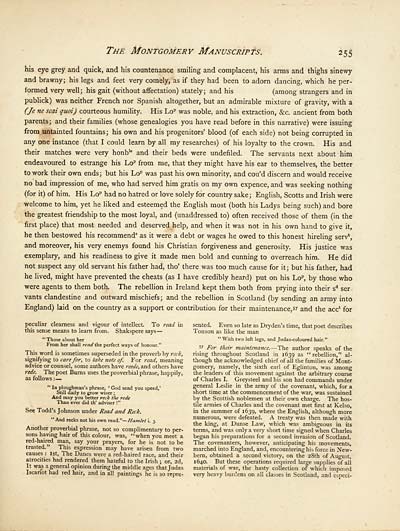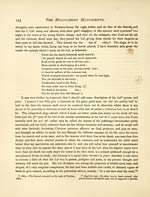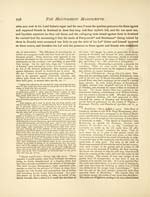Montgomery manuscripts
(269) Page 255
Download files
Complete book:
Individual page:
Thumbnail gallery: Grid view | List view

The Montgomery Manuscripts. 255
his eye grey arid quick, and his countenance smiling and complacent, his arms and thighs sinewy
and brawny; his legs and feet very comely, as if they had been to adorn dancing, which he per-
formed very well; his gait (without affectation) stately; and his (among strangers and in
publick) was neither French nor Spanish altogether, but an admirable mixture of gravity, with a
(Je ne scai quoi) courteous humility. His Lo p was noble, and his extraction, &c. ancient from both
parents; and their families (whose genealogies you have read before in this narrative) were issuing
from untainted fountains; his own and his progenitors' blood (of each side) not being corrupted in
any one instance (that I could learn by all my researches) of his loyalty to the crown. His and
their matches were very honb le and their beds were undefiled. The servants next about him
endeavoured to estrange his Lo p from me, that they might have his ear to themselves, the better
to work their own ends; but his Lo p was past his own minority, and cou'd discern and would receive
no bad impression of me, who had served him gratis on my own expence, and was seeking nothing
(for it) of him. His Lo p had no hatred or love solely for country sake; English, Scotts and Irish were
welcome to him, yet he liked and esteemed the English most (both his Ladys being such) and bore
the greatest friendship to the most loyal, and (unaddressed to) often received those of them (in the
first place) that most needed and deserved help, and when it was not in his own hand to give it,
he then bestowed his recommend" as it were a debt or wages he owed to this honest hireling serv',
and moreover, his very enemys found his Christian forgiveness and generosity. His justice was
exemplary, and his readiness to give it made men bold and cunning to overreach him. He did
not suspect any old servant his father had, tho' there was too much cause for it; but his father, had
he lived, might have prevented the cheats (as I have credibly heard) put on his Lo p , by those who
were agents to them both. The rebellion in Ireland kept them both from prying into their s a ser-
vants clandestine and outward mischiefs; and the rebellion in Scotland (by sending an army into
England) laid on the country as a support or contribution for their maintenance^ and the ace' for
peculiar clearness and vigour of intellect. To read in sented. Even so late as Dryden's time, that poet describes
this sense means to leam from. Shakspere says — Tonson as like the man
" Those about her " With two left legs, and Judas-coloured hair."
From her shall read the perfect ways of honour." q7 r* *i. • ■ / t^i .. , ■■ ,,
v ' " For their maintenance. — The author speaks of the
This word is sometimes superseded in the proverb by reck, rising throughout Scotland in 1639 as "rebellion," al-
signifying to care for, to take note of. For read, meaning though the acknowledged chief of all the families of Mont-
advice or counsel, some authors have reede, and others have gomery, namely, the sixth earl of Eglinton, was among
rede. The poet Burns uses the proverbial phrase, happily, the leaders of this movement against the arbitrary course
as follows : — of Charles I. Greysteel and his son had commands under
" In ploughman's phrase, ' God send you speed, 1 general Leslie in the army of the covenant, which, for a
Still daily to grow wiser ; short time at the commencement of the war, was sustained
And may you better reck t/u> rede by the Scottish noblemen at their own charge. The hos-
_ Than ever did th advtser ! ' t ile armies of Char i es and the covenant met first at Kelso,
See Todd's Johnson under Read and Reck. in the summer of 1639, where the English, although more
" And recks not his own read."- Hamlet i. 3 numerous, were defeated. A treaty was then made with
the king, at Dunse Law, which was ambiguous in its
Another proverbial phrase, not so complimentary to per- terms, and was only a very short time signed when Charles
sons having hair of this colour, was, "when you meet a began his preparations for a second invasion of Scotland,
red-haired man, say your prayers, for he is not to be The covenanters, however, anticipating his movements,
trusted. This expression may have arisen from two marched into England, and, encountering his force in New-
causes : 1st, The Danes were a red-haired race, and their bem, obtained a second victory, on the 28th of August,
atrocities had rendered them hateful to the Irish ; or, 2d, 1640. But these operations required large supplies of all
It was a general opinion during the middle ages that Judas materials of war, the hasty collection of which imposed
Iscanot had red hair, and in all paintings he is so repre- very heavy burdens on all classes in Scotland, and especi-
his eye grey arid quick, and his countenance smiling and complacent, his arms and thighs sinewy
and brawny; his legs and feet very comely, as if they had been to adorn dancing, which he per-
formed very well; his gait (without affectation) stately; and his (among strangers and in
publick) was neither French nor Spanish altogether, but an admirable mixture of gravity, with a
(Je ne scai quoi) courteous humility. His Lo p was noble, and his extraction, &c. ancient from both
parents; and their families (whose genealogies you have read before in this narrative) were issuing
from untainted fountains; his own and his progenitors' blood (of each side) not being corrupted in
any one instance (that I could learn by all my researches) of his loyalty to the crown. His and
their matches were very honb le and their beds were undefiled. The servants next about him
endeavoured to estrange his Lo p from me, that they might have his ear to themselves, the better
to work their own ends; but his Lo p was past his own minority, and cou'd discern and would receive
no bad impression of me, who had served him gratis on my own expence, and was seeking nothing
(for it) of him. His Lo p had no hatred or love solely for country sake; English, Scotts and Irish were
welcome to him, yet he liked and esteemed the English most (both his Ladys being such) and bore
the greatest friendship to the most loyal, and (unaddressed to) often received those of them (in the
first place) that most needed and deserved help, and when it was not in his own hand to give it,
he then bestowed his recommend" as it were a debt or wages he owed to this honest hireling serv',
and moreover, his very enemys found his Christian forgiveness and generosity. His justice was
exemplary, and his readiness to give it made men bold and cunning to overreach him. He did
not suspect any old servant his father had, tho' there was too much cause for it; but his father, had
he lived, might have prevented the cheats (as I have credibly heard) put on his Lo p , by those who
were agents to them both. The rebellion in Ireland kept them both from prying into their s a ser-
vants clandestine and outward mischiefs; and the rebellion in Scotland (by sending an army into
England) laid on the country as a support or contribution for their maintenance^ and the ace' for
peculiar clearness and vigour of intellect. To read in sented. Even so late as Dryden's time, that poet describes
this sense means to leam from. Shakspere says — Tonson as like the man
" Those about her " With two left legs, and Judas-coloured hair."
From her shall read the perfect ways of honour." q7 r* *i. • ■ / t^i .. , ■■ ,,
v ' " For their maintenance. — The author speaks of the
This word is sometimes superseded in the proverb by reck, rising throughout Scotland in 1639 as "rebellion," al-
signifying to care for, to take note of. For read, meaning though the acknowledged chief of all the families of Mont-
advice or counsel, some authors have reede, and others have gomery, namely, the sixth earl of Eglinton, was among
rede. The poet Burns uses the proverbial phrase, happily, the leaders of this movement against the arbitrary course
as follows : — of Charles I. Greysteel and his son had commands under
" In ploughman's phrase, ' God send you speed, 1 general Leslie in the army of the covenant, which, for a
Still daily to grow wiser ; short time at the commencement of the war, was sustained
And may you better reck t/u> rede by the Scottish noblemen at their own charge. The hos-
_ Than ever did th advtser ! ' t ile armies of Char i es and the covenant met first at Kelso,
See Todd's Johnson under Read and Reck. in the summer of 1639, where the English, although more
" And recks not his own read."- Hamlet i. 3 numerous, were defeated. A treaty was then made with
the king, at Dunse Law, which was ambiguous in its
Another proverbial phrase, not so complimentary to per- terms, and was only a very short time signed when Charles
sons having hair of this colour, was, "when you meet a began his preparations for a second invasion of Scotland,
red-haired man, say your prayers, for he is not to be The covenanters, however, anticipating his movements,
trusted. This expression may have arisen from two marched into England, and, encountering his force in New-
causes : 1st, The Danes were a red-haired race, and their bem, obtained a second victory, on the 28th of August,
atrocities had rendered them hateful to the Irish ; or, 2d, 1640. But these operations required large supplies of all
It was a general opinion during the middle ages that Judas materials of war, the hasty collection of which imposed
Iscanot had red hair, and in all paintings he is so repre- very heavy burdens on all classes in Scotland, and especi-
Set display mode to:
![]() Universal Viewer |
Universal Viewer | ![]() Mirador |
Large image | Transcription
Mirador |
Large image | Transcription
Images and transcriptions on this page, including medium image downloads, may be used under the Creative Commons Attribution 4.0 International Licence unless otherwise stated. ![]()
| Histories of Scottish families > Montgomery manuscripts > (269) Page 255 |
|---|
| Permanent URL | https://digital.nls.uk/95236155 |
|---|
| Description | A selection of almost 400 printed items relating to the history of Scottish families, mostly dating from the 19th and early 20th centuries. Includes memoirs, genealogies and clan histories, with a few produced by emigrant families. The earliest family history goes back to AD 916. |
|---|

